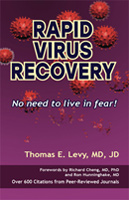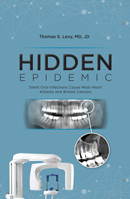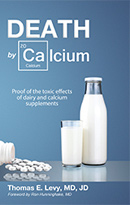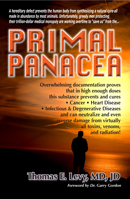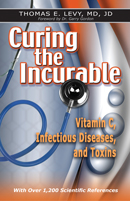Vitamin C And The Law
11/11/2010 by Dr. Thomas Levy(OMNS November 11, 2010) As a patient, you have the right to any therapy that is not prohibitively expensive, established to be effective, and not prohibitively toxic.
Any physician, or panel of hospital-based physicians, claiming that vitamin C is experimental, unapproved, and/or posing unwarranted risks to the health of the patient, is really only demonstrating a complete and total ignorance or denial of the scientific literature. A serious question as to what the real motivations might be in the withholding of such a therapy then arises.
A doctor has the right to refuse to see you or treat you. A doctor does not have the right to deny you any therapy that is inexpensive and known to be effective and nontoxic; if there is toxicity involved, the patient can discharge his responsibility for such toxicity with proper informed consent. A doctor does not have the right to deny you consultation with another doctor that may have conflicting medical points of view.
Just as ignorance of the law is no sound defense to legal charges brought against you, ignorance of medical fact is ultimately no sound defense for a doctor withholding valid treatment, especially when that information can be easily accessed
While a hospital may or may not have a legal right to dictate to its physicians what they may or may not do, the patient and the family of the patient have the legal right to sue that hospital for any negative outcome that is perceived to directly result from such interference in patient care.
The patient and the family of the patient also have the right to sue any physician that refuses to administer an inexpensive, nontoxic therapy that is established to be of use in the medical literature, such as vitamin C, especially when no other options other than permitting the patient to die are offered. Doctors have a very strong herd mentality, and they do not thrive well when forced to deal with a lawsuit alone, and possibly not even with the backup of their malpractice insurance company, which would seriously question why an approved medicine such as vitamin C was withheld from the patient. Remember that any insurance company always looks for a legal way not to pay expenses or settlements.
In a court of law, legal decisions regarding medical issues are usually decided by comparing a doctor's actions (or inactions) to the accepted standards of medical practice in the community in question. The legal sticking points relate to how different that community might be from others, and whether the accepted standard of practice is too far deviated from overall mainstream medicine norms.
The legal system struggles with reconciling something well-established in the medical literature, but not reflected in the standard medical textbooks. A case involving withheld vitamin C would not currently have any direct legal precedent of which I am aware, but there are multiple reasons to believe that the time is ripe for the law to rule for the patient's right to receive vitamin C in the hospital over the doctor's "right" to withhold it.
The time for changing the view of vitamin C by the law and mainstream medicine has arrived. Over the past 20 years, many more doctors have begun to routinely give 50 grams (50,000 mg) or more of vitamin C intravenously on a regular basis to patients with the entire gamut of medical conditions. These doctors have come from the same medical schools and postgraduate training programs as their unlike-minded mainstream counterparts, meaning they have the same traditional credentials and warrant equal consideration.
The law recognizes that there is no one perfect medical approach to a patient. Having an increasingly large body of doctors who recognize the importance of vitamin C will allow the courts to permit an additional "school of thought" as long as enough traditionally-trained doctors think that way. The question yet to be legally determined is, How many such doctors is "enough?"
Under United States law, the long-standing Frye standard (1923) held that expert opinion based on a scientific technique is admissible only where the technique is generally accepted as reliable in the relevant scientific community. This standard made it almost impossible for any technique embraced by a minority, however competent or appropriately trained, to ever coexist with, much less supersede, a technique embraced by the larger scientific community. Basically, majority always wins, and minority always loses.
The Daubert standard (1993) finally replaced the Frye standard. Daubert held that the court should:
- Evaluate whether the science can be or has been tested
- Determine whether the science has been published or peer-reviewed
- Consider the likelihood of error (quality and quantity of the data)
- Evaluate the general acceptance of the theory in the scientific community
If the court is so inclined, the evaluation of general acceptance in the scientific (medical) community does not have to invoke the "majority rules" nature of the earlier Frye standard. Rather, it can allow the consideration that enough scientific studies embraced by enough qualified doctors could prevail legally. However, any final ruling would be heavily dependent on the particular facts of the case and the precise intervention requested of the court.
The principles of Daubert do not assure a victory for vitamin C proponents in a court of law, but they do allow an objective judge to see that the body of evidence supporting vitamin C usage is clearly established in the mainstream medical literature, warranting a thorough legal evaluation as to why it is not yet a permissible therapy. These principles allow for much more flexibility than the earlier Frye "majority rules" standard.
Also, with any individual case in which a doctor refuses to administer vitamin C and serious damage (including death) occurs, a strong legal case can be now be made that the burden of proof falls with the doctor to show:
- That the therapy was exceptionally expensive, toxic, and/or unproven
- That the patient's best interests were somehow best served by withholding vitamin C
Always try to make an alliance with your doctor and avoid an adversarial relationship if at all possible. Theoretically, if your doctor really wants to do what is best for the patient and is not more concerned with being told what to do, much stress and conflict can be avoided by all. However, do not hesitate to let your doctor know directly that you will avail yourself of all your rights or your family member's rights as a patient to optimal health care if so forced.
A very common "out" in all of these scenarios is to suggest that "further studies" should be done. More information is always useful, but vitamin C has already been researched more than any other supplement, or even most pharmaceutical drugs, in the history of the planet. Don't allow another 70 years of research to transpire before its proper use begins.
Stand up for your rights today. The way medicine is practiced will never change until the public demands it and the law legitimizes it. Remember, it's your body and your health. Doctors are answerable to you, not you to them.
An expanded version of "Vitamin C and the Law" by Dr. Levy is available as a free pdf download at http://www.peakenergy.com/downloads/VC.NZ.Sept.2010.pdf
References:
Frye v. United States, 293 F. 1013 (D.C. Cir. 1923)Daubert v. Merrell Dow Pharmaceuticals, 509 U.S. 579 (1993)
More Orthomolecular articles:
11/11/2010 | Vitamin C And The Law
02/14/2012 | Vitamin C Prevents Vaccination Side Effects; Increases Effectiveness
08/27/2013 | Vitamin C, Shingles, and Vaccination
09/03/2014 | The Clinical Impact of Vitamin C:
My Personal Experiences as a Physician
05/31/2019 | Curing Polio with Magnesium: The tip of the iceberg?
10/25/2019 | Reboot Your Gut: Optimizing Health and Preventing Infectious Disease
01/29/2020 | Vaccinations, Vitamin C, Politics, and the Law
07/18/2020 | COVID-19: How can I cure thee? Let me count the ways
08/21/2020 | Curing Viruses with Hydrogen Peroxide: Can a simple therapy stop the pandemic?
05/10/2021 | Hydrogen Peroxide Nebulization and COVID Resolution: Impressive Anecdotal Results
06/21/2021 | Resolving Long-Haul COVID and Vaccine Toxicity: Neutralizing the Spike Protein
10/18/2021 | Canceling the Spike Protein: Striking Visual Evidence
12/11/2021 | Vitamin C and Cortisol: Synergistic Infection and Toxin Defense
02/01/2022 | How COVID Helped Me Regain Good Health
05/11/2022 | The Restoration of Vitamin C Synthesis in Humans
06/01/2022 | Monkeypox Infection - To Fear or Not to Fear?
09/08/2022 | Atherosclerosis is a Non-Healing Wound
01/05/2023 | Myocarditis: Once Rare, Now Common
02/04/2023 | Resolving Colds to Advanced COVID with Methylene Blue
03/10/2023 | Resolving Persistent Spike Protein Syndrome
07/31/2023 | The Toxic Nutrient Triad
09/27/2023 | Persistent Spike Protein Syndrome: Rapid Resolution with Ultraviolet Blood Irradiation
10/12/2023 | Schizophrenia Is Chronic Encephalitis...and Niacin Cures It
11/03/2023 | Heart Failure or Therapy Failure? Toxins Cause Cardiomyopathy
12/17/2023 | Root Canals Cause Breast Cancer-Frequently
Article also available at Orthomolecular Medicine News Service
OMNS free subscription link http://orthomolecular.org/subscribe.html
OMNS archive link http://orthomolecular.org/resources/omns/index.shtml


